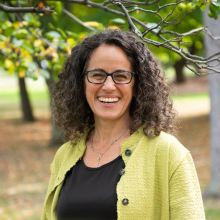Bennett, Elena
Professor
Canada Research Chair in Sustainability Science

"In the Social-Ecological Workshop, we study the inner workings of multifunctional landscapes, in partnership with the people who depend on them. We use fieldwork, modelling, scenario planning, and synthesizing to understand social-ecological systems. We believe that envisioning the future we want is the first step towards achieving it."
B.A. Biology and Environmental Studies, Oberlin College
M.Sc. Land Resources, University of Wisconsin
Ph.D. Limnology and Marine Sciences, University of Wisconsin
- Elected Fellow, The Royal Society of Canada (2023)
- Elected Fellow, Beijer Institute of Ecological Economics of the Royal Swedish Academy of Sciences (2023)
- Elected Member, US National Academy of Sciences (2022)
- Guggenheim Fellowship (2022)
- David Thomson Award for Graduate Supervision and Teaching (2022)
- Web of Science Highly Cited Researcher, Clarivate (2020)
- Ecological Society of America Innovations in Sustainability Science Award, for “Bennett et al. Bright Spots: Seeds of a Good Anthropocene” (2019)
- EWR Steacie Fellowship (2017-2019)
- Alice Johannsen Award (for the Montérégie Connection Project) from the Mont Saint-Hilaire Nature Centre for a significant contribution towards the protection of nature (2016)
- McGill Catalyst Award for staff contribution to sustainability on campus (2015)
- Trottier Public Policy Fellowship (with $80,000 funding to initiate public policy engagement related to the Monteregie Connection project) (2013-2014)
- Winner, Carrie M. Derick Award for Excellence in Graduate Supervision (2013)
- Selected to be a member of the Global Young Academy (2013-2017)
- IAP Young Scientist representative of the Royal Society of Canada at the Summer Davos meeting of the World Economic Forum. Tianjin, China, September (2012)
- Faculty of Agriculture and Environmental Science nominee for the Principal’s Award for Teaching Excellence (2012)
- Macdonald Campus Award for Teaching Excellence (2012)
- Leopold Leadership Fellow (2011)
Dr. Elena Bennett is Professor and Canada Research Chair in Sustainability Science at McGill University. Her work focuses on the interactions among ecosystem services and how we can manage these interactions for multifunctional working landscapes, using a landscape ecology and systems ecology perspective. She was the leader of the Montérégie Connection project that worked with stakeholders to understand the role of landscape connectivity in the provision of a dozen ecosystem services and how those might change across a range of future scenarios. She is now leading ResNet, a 100+ person NSERC Strategic Network that builds on the Montérégie Connection to compare ecosystem service provision in six exemplar working landscapes across Canada. Her most recent work focuses on using radical transformative experiments in society as ‘seeds’ to improve storytelling and sense-making about how we might achieve a “good Anthropocene”. Dr. Bennett was a Leopold Leadership Fellow (2012). She won the Macdonald Campus Award for (Undergraduate) Teaching Excellence in 2012 the Carrie M. Derick Award for Excellence in Graduate Supervision in 2013, and the David Thomson Award for Graduate Supervision in 2022. She won a Guggenheim Fellowship to pursue interdisciplinary work on multifunctional agricultural landscapes of Canada in 2022. She is a Fellow of The Royal Society of Canada Scholars (2023) and a member of the US National Academy of Sciences (elected 2022).
Active affiliations
- Transition Team, SocSES (Society for Social-Ecological Science) (2024-2025)
- Member, Earth Decides community of the World Economic Forum (2023 - 2024)
- Chair, International Scientific Advisory Council, Stockholm Resilience Centre (2022- 2027)
- External Advisory Council, Statistics Canada Census on Environment (2022-2024)
- Editorial board member, Frontiers in Ecology and Environment (2010 - )
- CLA (Coordinating Lead Author), Chapter 3, IPBES Transformations Assessment (2022-2025)
To build a better future, we need a deeper understanding of the ecosystem dynamics that are shaped by relationships between people and nature. Our research fosters critical thinking about social-ecological systems in a setting where stakeholders, rights holders, and citizens are engaged in the scientific process.
We work on research in four thematic areas: ecosystem service assessment and monitoring; co-production of ecosystem services; multifunctional working landscapes; positive futures thinking
- Systems science
- Social-ecological systems
- Ecosystem services
- Nature's contributions to people, scenario planning, multifunctional landscapes, working landscapes